Going organic pragmatic decision for winery owner
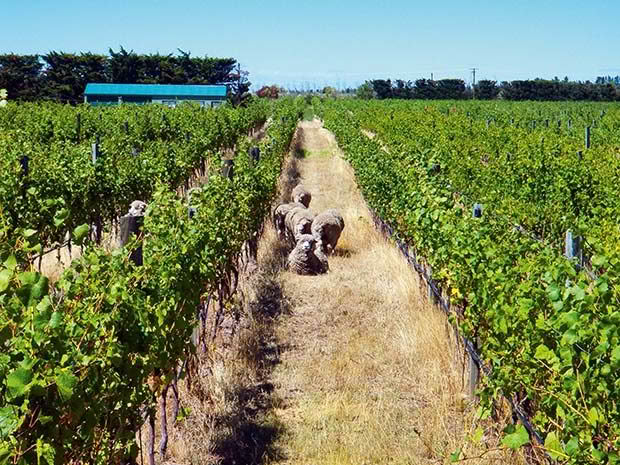
Sheep grazing the vineyard at Bellbird Winery, and doing some judicious pruning at the same time.

Going organic was a pragmatic decision for the owners of Bellbird Spring Winery – the sheep don’t mind either.
Words: Nadene Hall
Who: Guy Porter, Bellbird Spring
Where: Waipara Valley, North Canterbury
What : grapes & wine
Land: 10ha (25 acres)
Web: www.bellbirdspring.co.nz
One of the important secrets behind the successful transition to organic for winery Bellbird Spring is its workers. A specialist team sweeps in each January to work their magic over a few key weeks, playing an important role in caring for the aromatic white grape varieties on the Porter family’s two properties in the Waipara Valley.
“There’s no minimum wage for sheep which is pretty good,” says grape grower and winemaker Guy Porter. “For them it’s great because they’re always on a lunch break.”
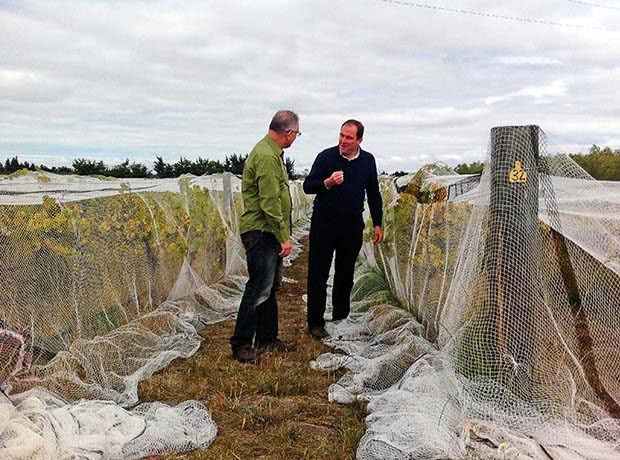
Donald Nordeng (left) of organic certifier BioGro visiting Guy Porter of Bellbird Spring winery.
The sheep are one way Guy has changed how he manages the health of the Bellbird Spring grape crop now the business is transitioning to organic production. The sheep eat the lower leaves, allowing more light onto the fruit and more air to circulate, helping to prevent fungal infections.
It’s a unique alternative to spraying, and it echoes the pragmatism in the decision to turn from conventionally-run to organic in a three year process which was completed in January, 2016.
Guy and his family live on Block 8 in the Waipara Valley, about an hour’s drive north of Christchurch. Just up the road are his parents Tom and Sheila Porter, who started the business with him and who live on the original Home Block among pinot noir, sauvignon blanc, pinot gris, gewurztraminer, riesling and muscat ottonel vines.
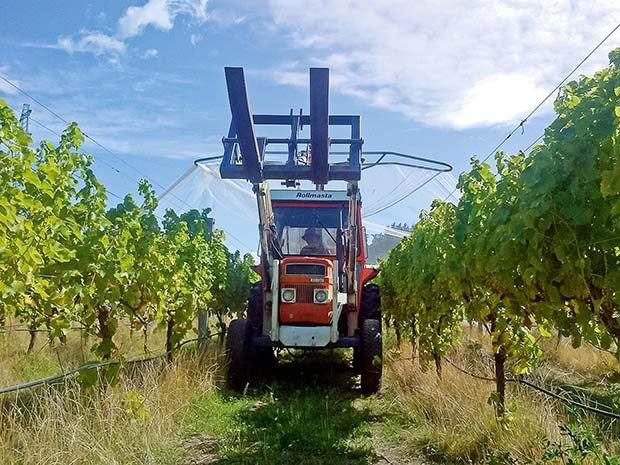
Pulling netting over the crop to protect it from birds.
It was living so close to their crop that first got Guy interested in turning their conventionally-run vineyard into something more sustainable and safer.
The original set-up echoed his training – he has a Bachelor of Agriculture Science with a major in oenology (the study of wine and wine making) from the University of Adelaide’s highly esteemed Roseworthy course – and Guy says he followed the lead of local grape growers in setting up Home Block and Block 8.
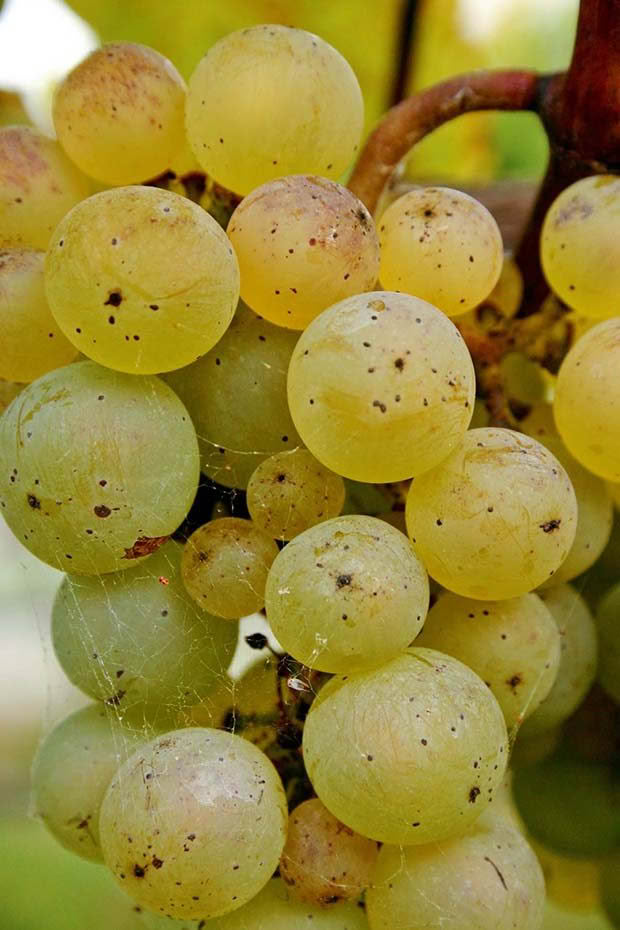
Riesling grapes.
“When I arrived, I didn’t know a lot about the area: I had a technical background, but I went around and asked a lot of people about how they did their grape growing, what their production techniques were, what varieties and clones and rootstocks they used and all sorts like that, and I sort of synthesised that information and came up with a plan that I thought was rational, and that plan included conventional agriculture.
“I think what was really interesting was the path to organics was really quite pragmatic. As part of OSH legislation you’re supposed to review hazards in the workplace and we did that early on and, in the process, started looking at material safety data sheets for the sprays that we were using in the vineyard and looked at some of the acute effects of the sprays and thought ‘this might be an effective treatment for the vineyard but if there’s an accident I don’t really like the idea of something going wrong and being exposed to this’.
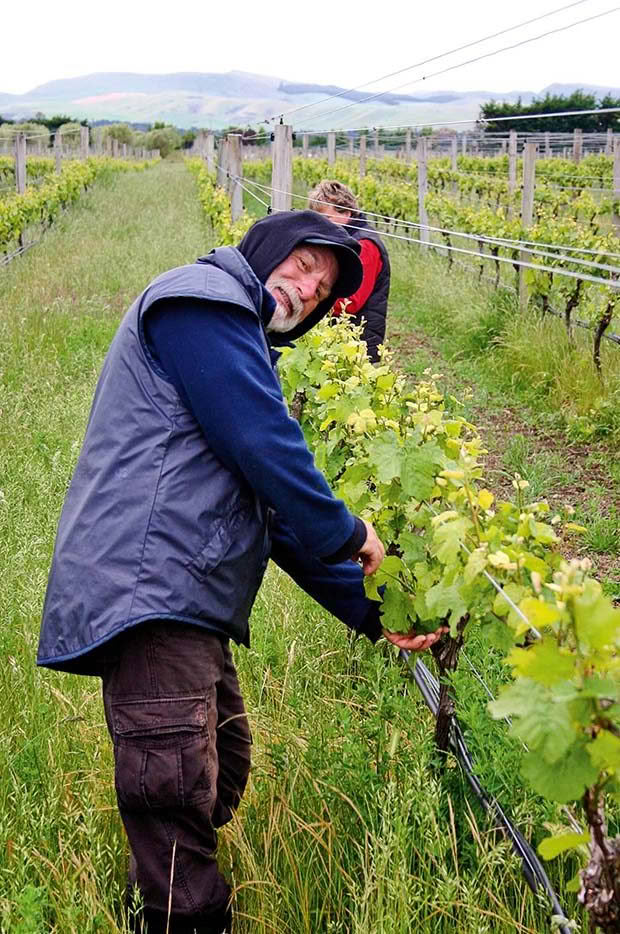
Shoot thinning the pinot noir vines.
“We tried to eliminate initially a lot of systemic fungicides and ultimately also eliminated the use of herbicides, so probably some 4-5 years ago we had stopped using systemic fungicides and were on the cusp of not using herbicides. From then on we followed a systemic fungicide and herbicide-free programme – I wouldn’t call it organic because you have to be certified but that was our intention.”
One of the big changes was in the way the vines were maintained. By opening up the fruit to more sunlight and air through leaf removal, it meant less exposure to fungal diseases which like high humidity and lower light levels.
That’s where their specialist workers came in.
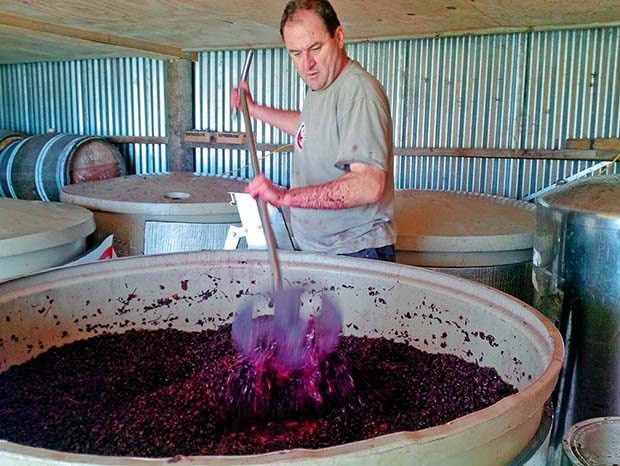
Guy plunging the pinot noir.
“We employ sheep,” says Guy, deadpan. “For a number of years now we’ve brought sheep into the vineyard after a certain point in berry development, when it’s increased in size to a certain degree, but hasn’t become soft, normally some time in January, and sections of the vineyard are crash-grazed to remove leaves.
“It just happens to be the average height of a sheep’s head in Canterbury fits very well with bunches in our vineyard: the sheep come in, if they’ve not come across vines before they start eating grass, then a couple start eating leaves, then they decide the leaves are quite nice and they’ll go along and strip leaves and very largely leave the bunches untouched.
“It is remarkable: you do get some casualties but it’s relatively little, and if it’s well monitored and you’re moving the sheep around from place to place, while looking and making sure there’s not too much damage, you can actually manage that problem.”
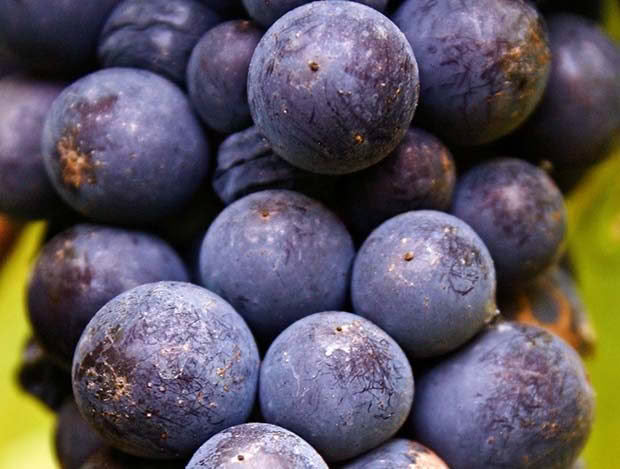
Pinot noir grapes.
The sheep team is just one management factor that helps to keep the Bellbird Spring grapes healthy. Guy already used a smaller bunch size and weight strategy, something common in organic vineyards.
“Organic production tends to produce lower yields, but we were already producing a high quality product at low yields. If you have relatively loose bunches… and if you have vines that are not overly vigorous you don’t have super thick canopies; if you open the bunch zone up you help to reduce the disease pressure.
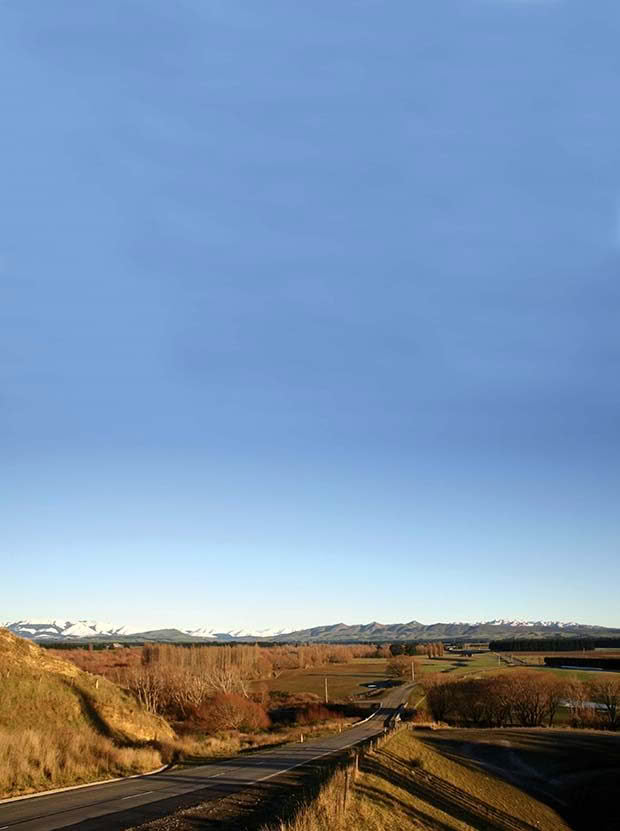
The two vineyards of Bellbird Spring are in the Waipara Valley, about an hour’s drive north of Christchurch.
“And it’s not as if organic viticulture doesn’t include some sprays: the use of, for example, powdered sulphur is the primary tool to protect against powdery mildew which is probably public enemy number one in North Canterbury, it would be the biggie. There are also some biological sprays that can be applied at certain points of the year. You’ve got to be careful, but in terms of the hazards, it’s a pretty low risk option.”
Finally entering the formal process of organic certification was inspired by the loss of a good overseas client.
“It was a restaurant, an important restaurant, and they decided that they would have 75% of their wine list listed as organic and in the process of the changes they made, they stopped being a customer and I thought to myself ‘well look, I think this is a good signal we need certification’.
“I already liked the idea of organic viticulture, we had in all but name been practicing it, but I realised we needed certification in order to avoid a loss in sales, and I think improve the preference our wines were given by different customers. I think it will open up more avenues – being organic doesn’t close off existing avenues – because there will be new distributors and new customers we can have conversations with about our wines in a way that’s good for the long term.”
Going organic will add to the business’s bottom line, but that’s just a happy bonus for the Porter family.
“I would take a long term view: if you’re considering organics I wouldn’t be put off by the lead-in period,you’re farming for the long term presumably and it’s not a quick fix, it’s not instant, it’s about the way you want to farm for the rest of your life so it’s not a long time.
“We were driven to produce something that is a good environment for our family: we live on our land and I feel happy that the way we’re growing grapes now is good for us from a health point of view, it’s good for our customers for the same reason, it has a lot of integrity and I get up in the morning not worried about that sort of thing, I’m a happy man that we’re doing the right thing.”
Love this story? Subscribe now!
 This article first appeared in NZ Lifestyle Block Magazine.
This article first appeared in NZ Lifestyle Block Magazine.
